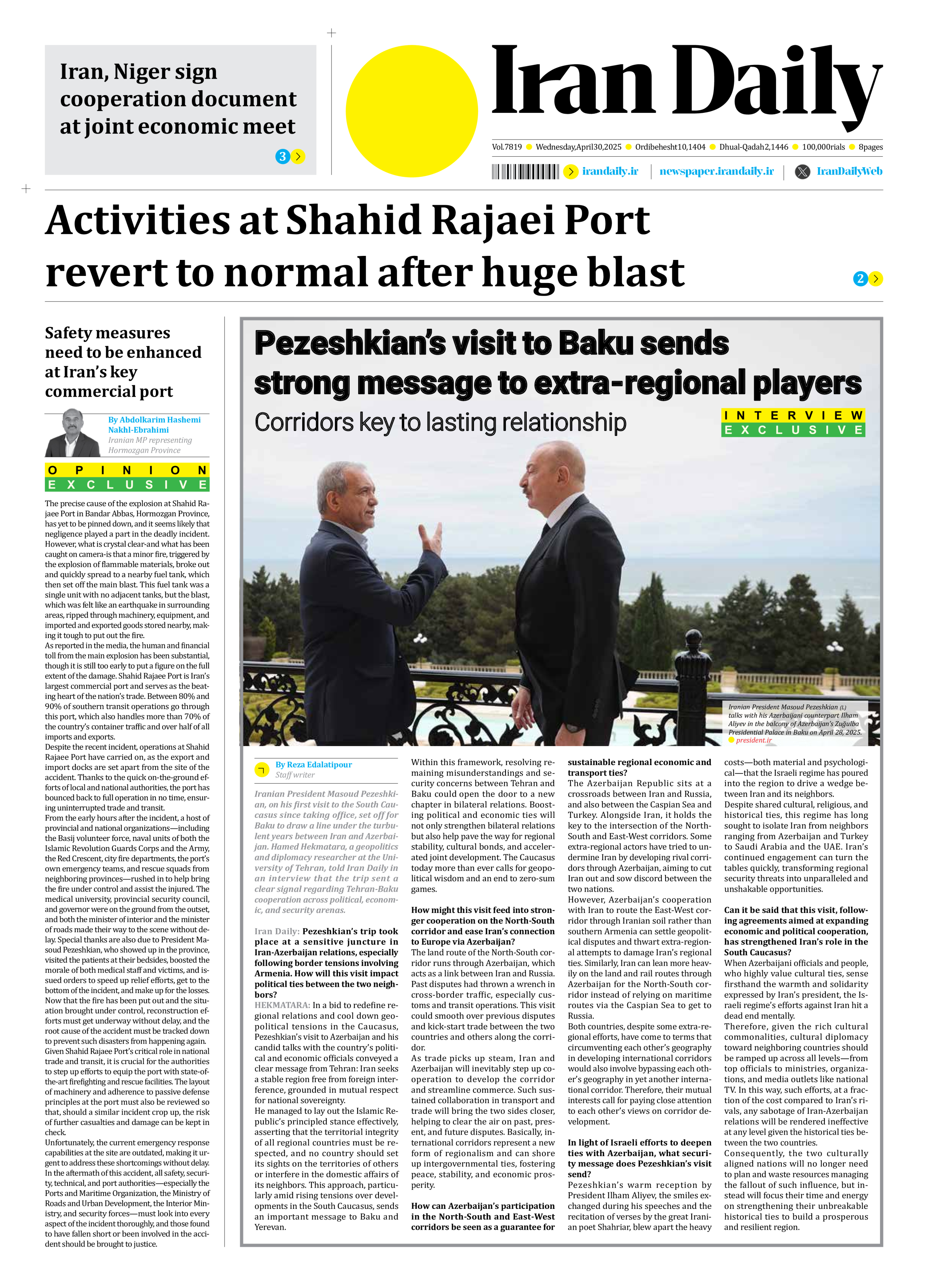
Pezeshkian’s visit to Baku sends strong message to extra-regional players
Corridors key to lasting relationship
By Reza Edalatipour
Staff writer
Iranian President Masoud Pezeshkian, on his first visit to the South Caucasus since taking office, set off for Baku to draw a line under the turbulent years between Iran and Azerbaijan. Hamed Hekmatara, a geopolitics and diplomacy researcher at the University of Tehran, told Iran Daily in an interview that the trip sent a clear signal regarding Tehran-Baku cooperation across political, economic, and security arenas.
Iran Daily: Pezeshkian’s trip took place at a sensitive juncture in Iran-Azerbaijan relations, especially following border tensions involving Armenia. How will this visit impact political ties between the two neighbors?
HEKMATARA: In a bid to redefine regional relations and cool down geopolitical tensions in the Caucasus, Pezeshkian’s visit to Azerbaijan and his candid talks with the country’s political and economic officials conveyed a clear message from Tehran: Iran seeks a stable region free from foreign interference, grounded in mutual respect for national sovereignty.
He managed to lay out the Islamic Republic’s principled stance effectively, asserting that the territorial integrity of all regional countries must be respected, and no country should set its sights on the territories of others or interfere in the domestic affairs of its neighbors. This approach, particularly amid rising tensions over developments in the South Caucasus, sends an important message to Baku and Yerevan.
Within this framework, resolving remaining misunderstandings and security concerns between Tehran and Baku could open the door to a new chapter in bilateral relations. Boosting political and economic ties will not only strengthen bilateral relations but also help pave the way for regional stability, cultural bonds, and accelerated joint development. The Caucasus today more than ever calls for geopolitical wisdom and an end to zero-sum games.
How might this visit feed into stronger cooperation on the North-South corridor and ease Iran’s connection to Europe via Azerbaijan?
The land route of the North-South corridor runs through Azerbaijan, which acts as a link between Iran and Russia. Past disputes had thrown a wrench in cross-border traffic, especially customs and transit operations. This visit could smooth over previous disputes and kick-start trade between the two countries and others along the corridor.
As trade picks up steam, Iran and Azerbaijan will inevitably step up cooperation to develop the corridor and streamline commerce. Such sustained collaboration in transport and trade will bring the two sides closer, helping to clear the air on past, present, and future disputes. Basically, international corridors represent a new form of regionalism and can shore up intergovernmental ties, fostering peace, stability, and economic prosperity.
How can Azerbaijan’s participation in the North-South and East-West corridors be seen as a guarantee for sustainable regional economic and transport ties?
The Azerbaijan Republic sits at a crossroads between Iran and Russia, and also between the Caspian Sea and Turkey. Alongside Iran, it holds the key to the intersection of the North-South and East-West corridors. Some extra-regional actors have tried to undermine Iran by developing rival corridors through Azerbaijan, aiming to cut Iran out and sow discord between the two nations.
However, Azerbaijan’s cooperation with Iran to route the East-West corridor through Iranian soil rather than southern Armenia can settle geopolitical disputes and thwart extra-regional attempts to damage Iran’s regional ties. Similarly, Iran can lean more heavily on the land and rail routes through Azerbaijan for the North-South corridor instead of relying on maritime routes via the Caspian Sea to get to Russia.
Both countries, despite some extra-regional efforts, have come to terms that circumventing each other’s geography in developing international corridors would also involve bypassing each other’s geography in yet another international corridor. Therefore, their mutual interests call for paying close attention to each other’s views on corridor development.
In light of Israeli efforts to deepen ties with Azerbaijan, what security message does Pezeshkian’s visit send?
Pezeshkian’s warm reception by President Ilham Aliyev, the smiles exchanged during his speeches and the recitation of verses by the great Iranian poet Shahriar, blew apart the heavy costs—both material and psychological—that the Israeli regime has poured into the region to drive a wedge between Iran and its neighbors.
Despite shared cultural, religious, and historical ties, this regime has long sought to isolate Iran from neighbors ranging from Azerbaijan and Turkey to Saudi Arabia and the UAE. Iran’s continued engagement can turn the tables quickly, transforming regional security threats into unparalleled and unshakable opportunities.
Can it be said that this visit, following agreements aimed at expanding economic and political cooperation, has strengthened Iran’s role in the South Caucasus?
When Azerbaijani officials and people, who highly value cultural ties, sense firsthand the warmth and solidarity expressed by Iran’s president, the Israeli regime’s efforts against Iran hit a dead end mentally.
Therefore, given the rich cultural commonalities, cultural diplomacy toward neighboring countries should be ramped up across all levels—from top officials to ministries, organizations, and media outlets like national TV. In this way, such efforts, at a fraction of the cost compared to Iran’s rivals, any sabotage of Iran-Azerbaijan relations will be rendered ineffective at any level given the historical ties between the two countries.
Consequently, the two culturally aligned nations will no longer need to plan and waste resources managing the fallout of such influence, but instead will focus their time and energy on strengthening their unbreakable historical ties to build a prosperous and resilient region.







